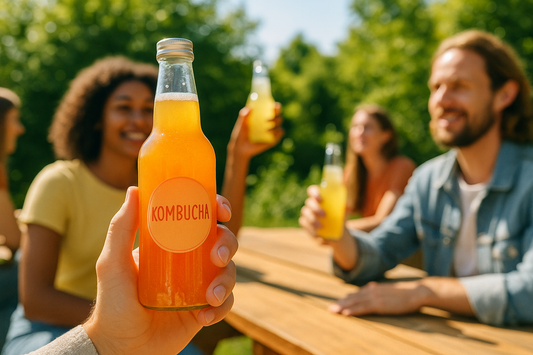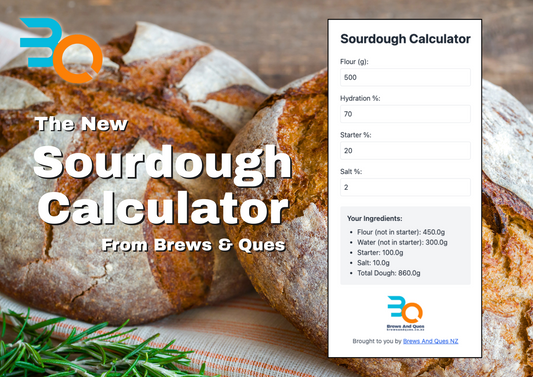Introduction
Kombucha has taken the beverage world by storm in recent years, with its tangy taste, effervescence, and potential health benefits captivating consumers worldwide.
While traditional kombucha has gained immense popularity, there's another intriguing variant known as Jun kombucha that has been making waves in the fermentation community. In this article, we'll explore the captivating world of kombucha and delve into the key differences between normal kombucha and Jun kombucha.
Understanding Kombucha:
Kombucha is a fermented tea beverage that has been consumed for centuries. It is created through a process of brewing tea, adding sugar, and introducing a symbiotic culture of bacteria and yeast (SCOBY) to initiate fermentation.
During fermentation, the SCOBY consumes the sugar and produces a range of beneficial compounds, resulting in the characteristic tart and fizzy taste of kombucha. This ancient elixir is known for its potential health benefits, including probiotics, antioxidants, and detoxification effects.

Introducing Jun Kombucha:
Jun kombucha is a lesser-known variant of kombucha that shares similarities with its more common counterpart but possesses distinct characteristics. Jun kombucha originated in Tibet and is believed to be a centuries-old tradition passed down through generations.
Unlike traditional kombucha, Jun kombucha is brewed using green tea and honey as its primary ingredients, which sets it apart in terms of flavor profile and fermentation process.
Key Differences between Jun and Traditional Kombucha:
-
Ingredients: While traditional kombucha uses black tea and sugar, Jun kombucha utilizes green tea and honey. This variation in ingredients contributes to the unique taste and characteristics of Jun kombucha.
-
SCOBY: The SCOBY used in Jun kombucha differs from the one used in traditional kombucha. Jun kombucha SCOBY is known as a Jun SCOBY and is specifically adapted to ferment with honey rather than sugar.
-
Fermentation Process: The fermentation process for Jun kombucha differs in terms of time and temperature. Jun kombucha typically requires a slightly longer fermentation period and prefers cooler temperatures compared to traditional kombucha.
-
Flavor Profile: Traditional kombucha offers a diverse range of flavours, often characterised by its tartness. In contrast, Jun kombucha tends to have a milder and more delicate flavor profile, with subtle floral and honey notes.
-
Alcohol Content: Due to the difference in fermentation process and ingredients, Jun kombucha may have a slightly higher alcohol content compared to traditional kombucha. However, both variants typically contain low levels of alcohol, generally below 0.5% ABV.

Exploring the Benefits of Jun Kombucha:
Jun kombucha offers similar health benefits to traditional kombucha, including probiotics for gut health, antioxidants for immune support, and detoxification properties. Additionally, the use of honey in Jun kombucha introduces unique compounds and potential additional benefits associated with honey consumption, such as antibacterial and anti-inflammatory properties.
Brewing and Enjoying Jun Kombucha:
Brewing Jun kombucha follows a similar process to traditional kombucha, with some minor adjustments. It's crucial to acquire a Jun SCOBY and use green tea and honey as the base ingredients. The fermentation time and temperature may vary compared to traditional kombucha, so careful monitoring and experimentation are key. Once ready, Jun kombucha can be enjoyed chilled, over ice, or even used as a mixer in creative cocktail recipes.
Both normal kombucha and Jun kombucha offer delightful flavours, potential health benefits, and the joy of home fermentation. Traditional kombucha is widely available and cherished for its diverse flavor profiles, while Jun kombucha brings a distinct twist with its use of green tea and honey.
Whether you prefer the tangy and robust flavours of traditional kombucha or the delicate and floral notes of Jun kombucha, both variants provide a refreshing and health-conscious alternative to sugary carbonated beverages.

When choosing between normal kombucha and Jun kombucha, it ultimately comes down to personal preference.
Traditional kombucha enthusiasts may appreciate the bold and tangy flavours that have made it a beloved beverage around the world. On the other hand, Jun kombucha offers a unique experience with its subtly sweet and nuanced taste, thanks to the green tea and honey combination.
It's worth noting that while both kombucha variants offer potential health benefits, individual reactions and sensitivities may vary. Some individuals may find that they tolerate one type better than the other, or they may have specific dietary considerations that lead them to choose one variant over the other.
For those interested in brewing their own kombucha at home, it's important to follow proper brewing and sanitation practices, regardless of whether you choose normal kombucha or Jun kombucha. This includes maintaining a clean brewing environment, using high-quality ingredients, and closely monitoring fermentation times and temperatures.
Conclusion:
Normal kombucha and Jun kombucha each have their own distinct characteristics and flavor profiles.
Whether you enjoy the tangy and diverse flavours of traditional kombucha or prefer the delicate sweetness of Jun kombucha, both offer a range of potential health benefits and the satisfaction of crafting your own fermented beverage at home.
Whichever variant you choose, kombucha is a versatile and enjoyable drink that can be enjoyed on its own or used as a base for creative and refreshing concoctions.
Cheers to the wonderful world of kombucha, where every sip is an adventure in flavor and well-being!
Be sure to check out our extensive range of Symbiota Kombucha & Food Fermentation products and as always, let us know if we can help in any way.








